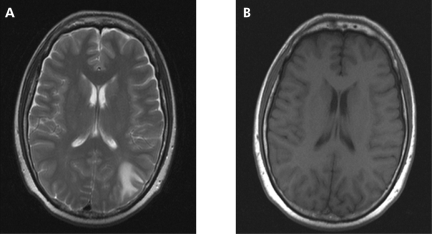We report a case of a 55 year old Chinese female never smoker who presented with a 6 month history of cough in October 2002. In November 2002 she underwent a right middle lobectomy for adenocarcinoma. In June 2003 a CT scan showed recurrences in the mediastinum, pleura, and ribs. In January 2004 she completed six cycles of treatment with gemcitabine and carboplatin and the CT scan following treatment demonstrated a partial response. In June 2004 she developed breathlessness, unsteadiness, dizziness, and weakness involving the right upper limb. A CT scan showed disease recurrence in the chest with multiple lesions in her right lung and precarinal nodes and brain metastases. She received second line therapy with docetaxel and whole brain radiotherapy (20 Gy in five fractions) for brain metastases in July 2004. However, chemotherapy was suspended after two cycles because of life threatening sepsis. A CT scan performed after chemotherapy showed significant disease response in the thorax.
In December 2004 she developed progressively worsening pulmonary and neurological symptoms including dizziness. An MRI scan showed cerebral metastases with lesions in the left and right parietal lobes (fig 1A). She was commenced on third line therapy with erlotinib (Roche, 150 mg daily). Within a week of starting treatment her neurological symptoms resolved and her breathlessness improved. An MRI scan taken 6 weeks after starting erlotinib showed a complete response of brain metastases (fig 1B). Six months after starting treatment she remains clinically well on erlotinib without chest related or neurological symptoms except for a grade 1 skin rash.
Figure 1 (A) MRI scan of one peripheral lesion in the right parietal lobe before starting treatment with erlotinib and (B) a repeat scan 6 weeks later indicating complete response of this metastasis.
The presence of somatic mutation in epidermal growth factor receptor (EGFR) gene has been associated with a higher responsiveness to erlotinib.1,2 We sequenced exons 18–21 of the EGFR gene using DNA extracted from tumour and normal lung tissue obtained at previous resection: the L858R mutation was detected. This point mutation in the activation loop of the kinase domain is linked to erlotinib responses.1,2
This is the first case report to show that erlotinib can be used to induce complete remission in brain disease from non‐small cell lung cancer (NSCLC). Although gefitinib, another anti‐EGFR small molecule, can induce remission of brain secondaries,3 differences exist in molecule structure and binding profiles of these receptor tyrosine kinase inhibitors.4 Furthermore, erlotinib treatment is now also associated with a survival benefit in NSCLC.5 Brain metastases are a significant problem in individuals with NSCLC and, as adjuvant chemotherapy, concurrent chemoradiation and more effective third generation cytotoxic agents are prolonging survival, its rate might increase. Future studies should investigate the efficacy of combined erlotinib and brain irradiation.
Footnotes
This work was supported in part by the London Lung Cancer Group, London, UK (Registered Charity No. 1074994) which received funding from Roche to support research on erlotinib.
Competing interests: none.
References
- 1.Pao W, Miller V A. Epidermal growth factor receptor mutations, small‐molecule kinase inhibitors, and non‐small‐cell lung cancer: current knowledge and future directions. J Clin Oncol 2005232556–2568. [DOI] [PubMed] [Google Scholar]
- 2.Tsao M S, Sakurada A, Cutz J C.et al Erlotinib in lung cancer: molecular and clinical predictors of outcome. N Engl J Med 2005353133–144. [DOI] [PubMed] [Google Scholar]
- 3.Cappuzzo F, Ardizzoni A, Soto‐Parra H.et al Epidermal growth factor receptor targeted therapy by ZD 1839 (Iressa) in patients with brain metastases from non‐small cell lung cancer (NSCLC). Lung Cancer 200341227–231. [DOI] [PubMed] [Google Scholar]
- 4.Fabian M A, Biggs W H, 3rd, Treiber D K.et al A small molecule‐kinase interaction map for clinical kinase inhibitors. Nat Biotechnol 200523329–336. [DOI] [PubMed] [Google Scholar]
- 5.Shepherd F A, Rodrigues Pereira J, Ciuleanu T.et al Erlotinib in previously treated non‐small‐cell lung cancer. N Engl J Med 2005353123–132. [DOI] [PubMed] [Google Scholar]



